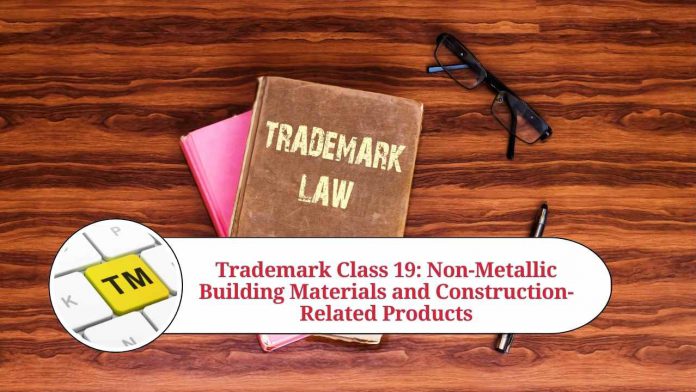Trademark Class 19: All You Need to Know
Trademark classes are categories used by the World Intellectual Property Organization (WIPO) to classify goods and services for the purpose of trademark registration. There are 45 trademark classes in total, and each class covers a specific set of products or services. In this blog, we’ll focus on Trademark Class 19.
What is Trademark Class 19?
Trademark Class 19 covers a wide range of non-metallic building materials, including asphalt, bitumen, and tar; non-metallic rigid pipes for building; and non-metallic transportable buildings. This class also includes materials for road construction, such as paving blocks, flagstones, and gravel.
Goods Covered Under Trademark Class 19
The following goods are covered under Trademark Class 19:
- Building materials (non-metallic): This includes materials like asphalt, bitumen, tar, and pitch.
- Non-metallic rigid pipes for building: This includes PVC pipes, fiberglass pipes, and other non-metallic pipes used for building and construction purposes.
- Asphalt, pitch, and bitumen: These materials are used for road construction, waterproofing, and roofing.
- Non-metallic transportable buildings: This includes buildings like prefabricated houses, portable cabins, and other non-metallic buildings that can be easily transported.
- Monumental and building stone: This includes natural stone used for building and construction purposes, such as marble, granite, and sandstone.
- Cement, lime, and plaster: These materials are used for construction, repair, and maintenance of buildings and structures.
- Non-metallic chimneys and fireplaces: This includes chimneys and fireplaces made of non-metallic materials like bricks, concrete, and clay.
- Paving blocks, flagstones, and tiles: These materials are used for paving roads, sidewalks, and outdoor areas.
- Glass buildings, mirrors, and glassware: This includes glass materials used for building and construction purposes, such as glass walls, mirrors, and glassware.
Why is Trademark Class 19 Important?
Trademark Class 19 is important for businesses that deal with non-metallic building materials and construction-related products. By registering their trademarks under this class, they can protect their brand name and logo from infringement by other companies operating in the same field.
For example, a company that sells paving blocks can register its trademark under Class 19, which will prevent other companies from using a similar name or logo for their products. This provides legal protection to the business and helps in building brand reputation.
Trademark Class 19 is not just important for businesses that deal with non-metallic building materials and construction-related products, but also for companies that provide services related to these products. For example, a company that provides installation services for non-metallic rigid pipes for building can register its trademark under Class 19 to protect its brand name and logo.
It is important to note that trademark registration is not mandatory, but it is highly recommended. By registering a trademark under the appropriate class, a business can prevent others from using a similar name or logo for their products or services. This helps in building brand recognition and reputation, which can be crucial in a competitive market.
Furthermore, registering a trademark under Trademark Class 19 can also make it easier for businesses to expand globally. The WIPO’s Nice Classification system, which includes the 45 trademark classes, is recognized worldwide. By registering a trademark under the appropriate class, businesses can ensure that their brand is protected in different countries and regions.
Conclusion
In conclusion, Trademark Class 19 covers a wide range of non-metallic building materials and products used in construction. If you own a business that deals with these products or provides related services, it is essential to register your trademark under this class to protect your brand from infringement. Consult with a trademark attorney to ensure that your trademark registration is done correctly and that your brand is protected legally.
Read more useful content:
Frequently Asked Questions (FAQs)
What is Trademark Class 19?
Trademark Class 19 is one of the 45 classes of goods and services used by the World Intellectual Property Organization (WIPO) to classify trademarks based on the type of goods or services being offered.
What goods are covered under Trademark Class 19?
Trademark Class 19 covers non-metallic building materials, including asphalt, bitumen, and tar, non-metallic rigid pipes for building, non-metallic transportable buildings, materials for road construction, and more.
Who should register their trademark under Trademark Class 19?
Businesses that deal with non-metallic building materials and construction-related products or services should consider registering their trademark under Trademark Class 19.
How do I determine if I should register my trademark under Trademark Class 19?
Consult with a trademark attorney to determine the appropriate class for your business and ensure that your trademark registration is done correctly.
Is trademark registration mandatory?
Trademark registration is not mandatory, but it is highly recommended. Registering a trademark can provide legal protection and help in building brand recognition and reputation.
What are the benefits of registering a trademark under Trademark Class 19?
Registering a trademark under Trademark Class 19 can provide legal protection for a business’s brand name and logo and make it easier for businesses to expand globally.
How long does trademark registration last?
Trademark registration can last indefinitely as long as the registration is renewed every 10 years.
Can I register my trademark under multiple classes?
Yes, a business can register its trademark under multiple classes if it offers products or services that fall under different classes.
What is the process for trademark registration?
The process for trademark registration involves filing an application with the relevant trademark office, paying a fee, and providing proof of use of the trademark.
Can I use my trademark before it is registered?
Yes, a business can use its trademark before it is registered, but it is important to note that legal protection for the trademark only starts from the date of registration.




















